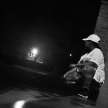The Life of an Independent Artist
Making the Decision and Beginning the Journey

A RISK WORTH TAKING.
At least that's how I see it. For years I pondered the idea of making music for a living. I watched my favorite artist in concerts, bought all their CDs (back when CDs were popular), watched every music video they released, and dreamed of they day I could be just like them.
Now that I'm older I view those former ideals a bit differently. See from the outside you see the lights and money and glamour. But when you say yes to a music career there's a ton of detail that you open the door to, some you never would have imagined.
My name is LaNeaya, stage name CreNaetive; and since the age of 10 I knew that music was my calling. By 20 I 'made my decision', and now at almost 25 I'm still working toward what used to be called a "big break".
You may be wondering, 'What is the big decision? Just do what you love right?'. Its not that easy. Deciding to pursue a music career means deciding to go without a lot of luxuries, choosing to cut out a lot of a social life, and being disciplined enough to build and develop yourself as a business and not just a music artist.
I'm five years in and I'm still finding a lot of large pieces that I wish I would have found back in years one and two. The head start I thought I had from simply being a trained vocalist and musician, was immediately erased when I began to understand how much more goes into actually building an artist's brand and business entity.
There's all-in-all about 8 major pieces in the foundation of being an independent artist. Many of which are continued focuses even after setting everything up. But once you have them in place, everything works smoothly and it will be easier to build on top of it all.
But I'm gonna start with what I feel is the Primary Half.
1. Deciding on an artist persona.
Who do you want to be as an artist? What kind of music do you want to make? Who do you intend to cater to? What message or values will you stand on?
Much of the first and last question will change as you continue to build and gain traction as an artist. You'll learn more about yourself and your style and you'll tweak certain elements of your brand to fit.
Some of your artist persona will come into view over time. Once you perform a few live shows and release a few singles or projects you'll have an idea of how you want the stage to feel, what consistencies you want to keep from piece to piece, and how you prefer to showcase your work.
A large part of the artist persona is appearance. How do you want your audience to see you? Are you the clean cut, always formal type? Do you prefer everyone feel comfy and warm? Do you want to go aggressive and maybe a little grunge? You decide on what fits your image and sound best. An easy way to make sure you maintain this image is to create a Pinterest board around it. You can find mine here.
2. Practice what you want to sound like.
When you make your decision you typically have an idea as to what kind of music you want to make. You probably listen to a lot of that type of music or at least know a few artists that make it. So engulf yourself in the sound. Listen to it, sing along, and practice. Don't just play around with it, actually sit down and practice singing, or playing, or rapping, or beat-boxing, or whatever it is that you want to. Practice your craft CONSISTENTLY.
Personally, I spent all of grade school learning vocal training and techniques. I even took vocal lessons outside of school and sang in my church choir pretty much my entire life. The variety of sound and learning techniques is what makes my vocal range and style so extensively diverse. If you want that for yourself, you have to be willing to take the time to get there.
To this day, I still do vocal warm-ups before every studio session and live performance runs before even recording a single note. I even do formal warm ups the morning of a performance or even just on what I like to call my administrative days to keep myself sharp. Yes I have the training but if i don't continue to practice I will loose the skill. Here are some of my favs.
3. Writing in your own signature style.
Many people think they have to write their song the same way all mainstream music is written. That's a lie. No two artists are the same, therefore no two songs should ever sound even close to identical; and I mean that in terms of the sound not necessarily the structure.
Most musicians write in the rather standard structure of: Chorus, Verse, Chorus, Verse, Bridge, Chorus. This is a perfectly fine place to start your writing and discover your individuality in your music. Maybe you want to start with the Verse instead of the Chorus. Maybe you don't want to do a Bridge at all. Maybe you want to be known for having Bridge in every song. You decide what you sound like and how you structure your music.
Maybe you want an entire album to tell a story from start to finish. Narrative writing in song form can be difficult and a let down if not executed properly. Some may event just want to stick to a theme throughout a set of singles. I find that people enjoy getting to link songs in a playlist by topic or mood. A friend of mine keeps a journal of one liners to use at any time in a new song, stuff that comes to her when she's not exclusively writing at the time. Find some tips and tricks that I look to for inspiration here.
4. Identifying and Building an Audience.
Your audience is and should always be your secondary focus after the music itself. This pillar is really one half of a larger pillar. But its the foundational element of the bigger picture. In order to begin to promote and market your music you have to have someone to see the promotions, someone you're marketing you; your AUDIENCE.
These are the people that want to hear you, the ones that already listen to the same kind of music you make, the ones that could possibly add your track to their favorite playlist, the ones streaming your release on repeat. Who are they? Where are they? And how do you find them?
Majority of people are on social media. Join Facebook groups and interact with other artists like you to see if maybe their fans will enjoy your music too. You could even consider cross promoting with another independent artists to build a following. But your initial audience, is your family and friends; the people already following you for one reason or another. Recruit them as a 'street team' and get them to help you promote as you release those first few songs. Using the support you already have is the best way to gain a larger audience. I've pinned some of my favorite blog posts on this particular subject here.
So there you have it.
The first few stepping stones to becoming an artist all laid out for you. The most important piece of advice I can give you is to take any and all advice as you see fit. Everything doesn't work for everyone, so use what you feel will best help you. I hope to share more soon.
Until then, Stay Creative.
About the Creator
CreNaetive
Independent artist and creative visionary with a passion for creative expression.
Check out the rest of my content and follow me on social here.






Comments
There are no comments for this story
Be the first to respond and start the conversation.